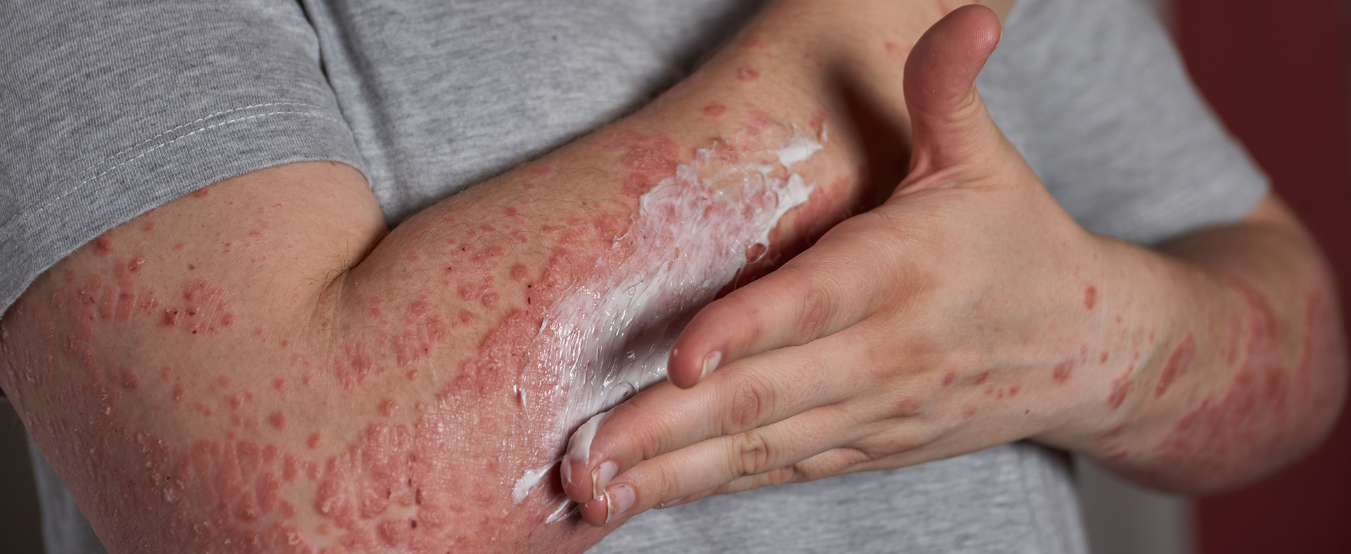Enquire Now

WHAT IS PSORIASIS?
Psoriasis is a chronic inflammatory skin condition caused by an overactive immune system, which leads to rapid skin cell turnover. As a result, skin cells build up on the surface, forming red, scaly, and often itchy patches.
Though it’s not contagious, psoriasis can be physically uncomfortable and emotionally distressing. It often has a relapsing-remitting nature, meaning symptoms can come and go depending on various internal and external factors.
TYPES:
- Plaque Psoriasis (Psoriasis Vulgaris): Most common type, Raised, red patches covered with silvery-white scales. Common on elbows, knees, scalp, and lower back.
- Guttate Psoriasis: Small, drop-like lesions, Often triggered by infections like strep throat. More common in children and young adults.
- Inverse Psoriasis: Smooth, red patches in body folds (underarms, groin, under breasts), Worsened by sweat and friction.
- Pustular Psoriasis: White, pus-filled blisters surrounded by red skin, can be localized or widespread.
- Erythrodermic Psoriasis: Rare but severe form, Involves widespread redness, peeling, and inflammation of the skin. Requires immediate medical attention.
- Psoriatic Arthritis: Affects the joints in about 30% of people with psoriasis. Leads to joint pain, swelling, and stiffness.
CAUSES:
- Immune Dysfunction – Overactivation of immune cells (especially T-cells) causes inflammation and accelerates skin cell growth.
- Genetic Predisposition – Family history increases risk, especially with specific immune-related genes (e.g., HLA-Cw6).
- Infections – Especially streptococcal throat infections in guttate psoriasis.
- Stress – A well-known trigger that also hampers healing.
- Skin Injuries – Scratches, cuts, or sunburn can trigger new lesions (Koebner phenomenon).
- Medications – Some drugs (like beta-blockers or steroids) can worsen psoriasis.
- Lifestyle Factors – Smoking, alcohol use, poor diet, and obesity are known contributors.
SYMPTOMS:
- Red, raised, inflamed patches of skin
- Silvery-white scales on plaques
- Dry, cracked skin that may bleed
- Itching, burning, or soreness
- Thickened or pitted nails (nail psoriasis)
- Joint pain and stiffness (in psoriatic arthritis)
HOW CAN NIRVANA HELP YOU TREAT PSORIASIS:
We design a holistic treatment protocol that focuses upon overall healing of your body, your treatment plan can consist of
-
DIET:
- INCLUDE : Anti-inflammatory, plant-based foods rich in antioxidants and omega-3s
- AVOID : gluten, dairy, sugar, and processed foods. These changes help reduce pro-inflammatory cytokines (like TNF-α and IL-17), support gut healing, restore immune balance, and promote detoxification through improved liver, gut, and lymphatic function.
- Practices like intermittent fasting, fermented foods, and hydration
-
YOGA:
- ASANAS : Balasana, Adho Mukha Svanasana, and Viparita Karani.
- PRANAYAMA : Deep breathing exercises, such as Nadi Shodhana, Ujjayi Pranayama
- Meditation for Stress Reduction : Mindfulness and meditation help to reduce emotional stress, which can worsen acne.
-
HYDROTHERAPY:
By supporting elimination through the skin and calming internal stress responses, hydrotherapy aids in reducing the frequency and severity of psoriatic flares.
- Neutral baths
- Cold compresses
- Steam Bath
- Contrast showers enhance
-
NATUROPATHY:
- Mud Application – Its adsorptive and anti-inflammatory properties help reduce redness, scaling, and itching in psoriatic lesions.
-
OZONE THERAPY:
- Helps relieve inflammation, improve oxygenation by removing excess free radicles from body.
- Treatments like ozone steam, local bagging have a good result in relieving symptoms and induce healing.
Back To Top
